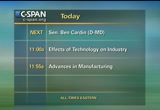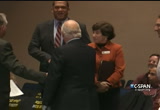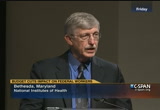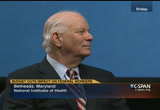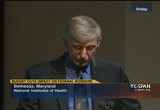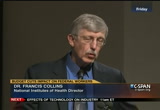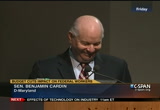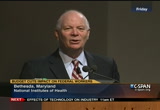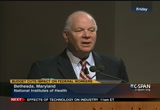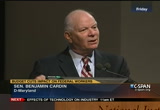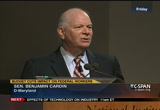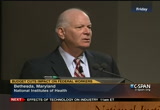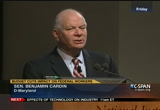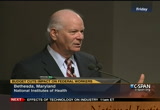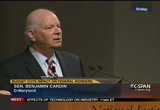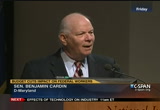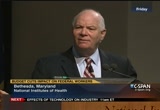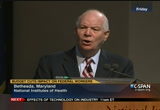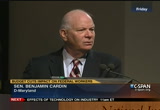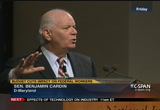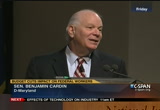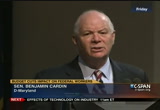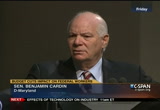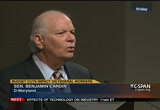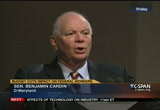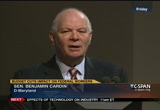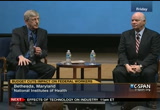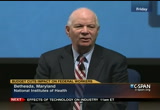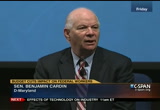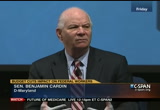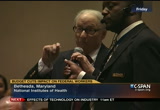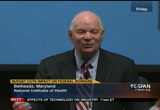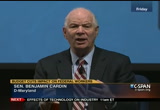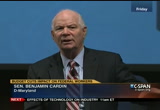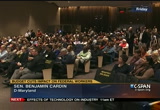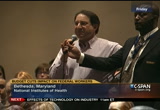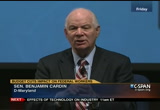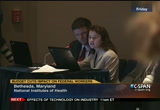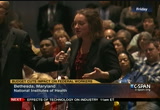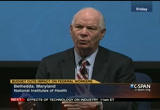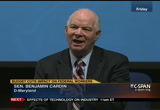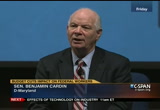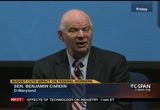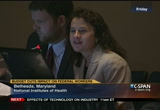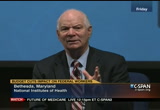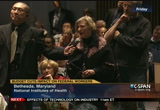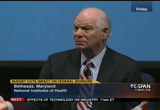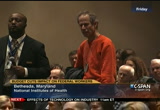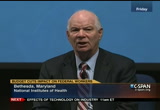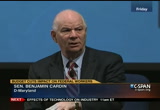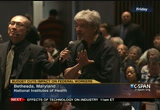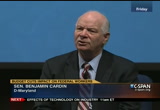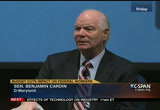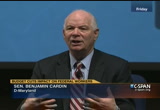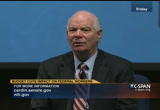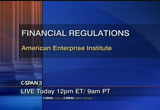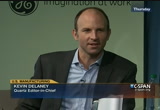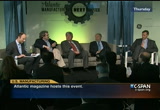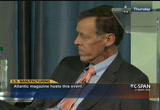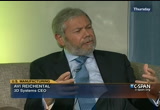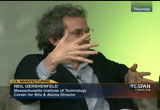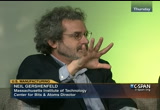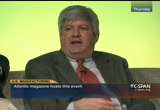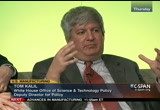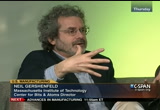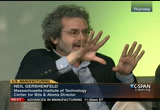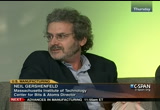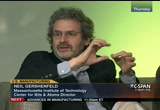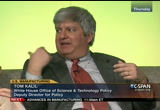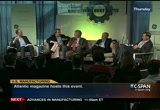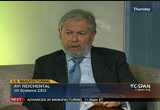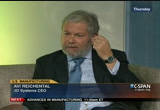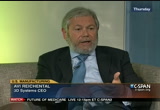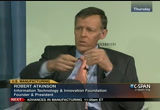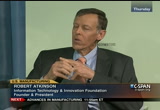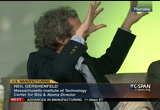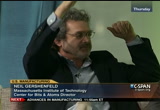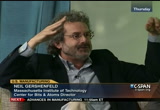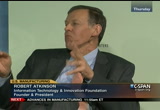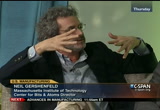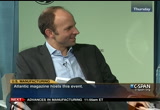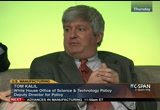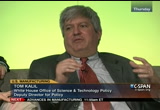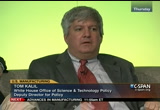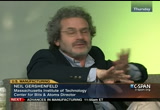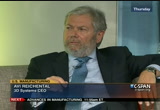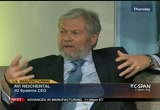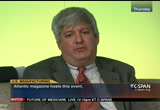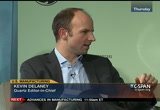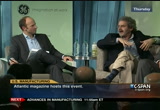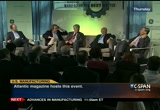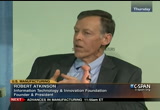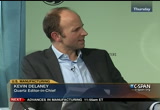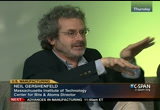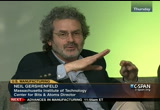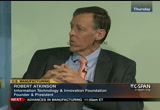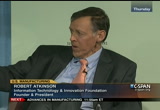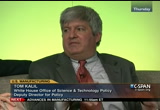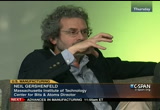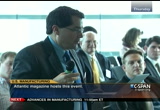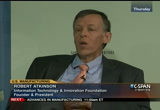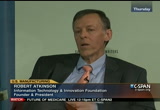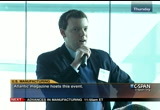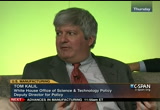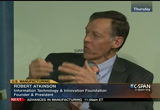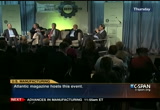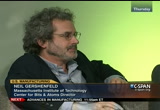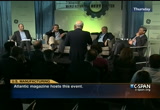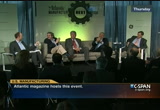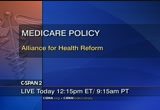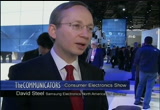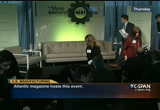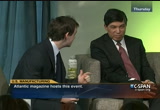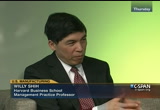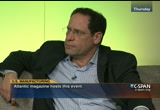tv Politics Public Policy Today CSPAN February 11, 2013 10:00am-12:00pm EST
10:00 am
back tomorrow morning at 7:00 a.m. eastern time for more of your phone calls. thanks for watching. [captions copyright national cable satellite corp. 2013] [captioning performed by national captioning institute] >> here is what is ahead today on c-span. up next, ben cardin speaks to employes at the national institute of halth. -- health. later, a look at it the of his and manufacturing. taking a look at some of our live programming. at noon eastern, former fdic
10:01 am
chairman, sheila bair. a bit later, the alliance for health reform host a forum on medicare policy in the future of the program. that gets under way at 12:15 eastern. we're live this afternoon at 1:30 this afternoon with a press conference with bipartisan members of the conference -- congress. >> as you might expect, given the breadth of products we have, one of the areas we are investing a lot is the multi- screen connectivity, because we have already seen humans will pay tasking. you were on your couch watching tv but also texting on your phone are on the internet. how do we link those devices to reach other and link them to the
10:02 am
internet? one very good example is the camera. and a camera now built in with 3g and 4g connectivity so you can take photographs were you go and instantly upload of tool website or to social media. bringing wireless connectivity to a camera. linking products to each other is a big thing for us and we think of value to the consumer. >> david steel from this year's consumer electronics show tonight at 8:00 eastern on "communicators" on cspan 2. >> ben cardin spoke with federal workers at the national institute of health and maryland. he talked about sequestration budget cuts and other issues.
10:03 am
sequestration calls for across- the-board cuts, totaling 1.2 trillion dollars over the next 10 years with 1.6 trillion coming out of the budget. this is just under an hour. >> good morning. >> that was a nice response. >> it's wonderful to see you here this morning at the national institute of health where we have the great fortune to have was united states senator ben cardin. welcome to all of you and those who are watching over the web. i want to say a few words about the senator and he is going to address you and we will have time for questions and answers. and we have ways to receive those for people who are here and over the internet. and we will make sure to respond to all directions from which those questions may come. >> for those of you with who live in maryland and about
10:04 am
three quarters of the people who work at n.i.h. have that residence, this is your senator. he is become a national leader on retirement, security, the environment, homeland security, minority health and health disparities and he is been a consist president supporter of the national institute of health and our mission and the work we do. he was elected to the senate in 2006 where he currently serves on the finances, public relations and business committees. he serves as co-chair on the security commission in europe. prior to this he represented mary mayor's third congressional district in the house of representatives. and before that in the maryland house of delegates where he served from 1967 to 1978. he was speaker.
10:05 am
>> he is a champion for medical research support for maryland's world class university hopkins university of maryland and several others. and he is a strong supporter of our state's biotech industry which is not located here by chance. he's also been i think a strong supporter throughout all of this as the importance of looking for curious for many diseases and protect our citizens from bioattacks. >> he's been here in a town meeting. we arrive here today at a particularly interesting moment given this is the month of february and there is a threat
10:06 am
which i'm sure he will talk about of something called the sequester which might strike us by march 1 if nothing happens. current estimates being that would reduce the n.i.h. budget for 2013 by $1.6 billion, already well into the fiscal year this would be a severely stressful situation. i know all of you here who believe in the mission come this morning hoping to hear words of encouragement about ways in which our enterprise can move forward in this time of uncertainty. i know he is a strong supporter of a good outcome here so we're happy to have him come this morning to tell us something about that and to encourage all of you who are working hard as supporters of this enterprise, as public servants who believe in what you are doing and to
10:07 am
tell that you this morning. so please welcome senator ben cardin. \[applause] >> thank you very much. thank you for your extraordinary leadership on behalf of n.i.h. it really is a pleasure to be here. dr. collins pointed out that along with senator i have the great honor of representing the state that headquarters n.i.h. and it is a great world class institution, no question about it. we not only have the world class research facility at n.i.h., but we have the world champion baltimore ravens. \[applause] we collected on the bet yesterday so we're in good spirits.
10:08 am
i haven't finished all the wine that was sent to us from california yet so i might indulge a little bit over the weekend. but we had to endure the california dentist crafts which are not as good as our crafts in mayor. it was a sweet moment and we thank you for that. it's a pleasure to be here. joan is here representing chris part of our congressional team. we thank chris for everything he does as the leader in the united states house of representatives on budget issues there is no stronger advocate for n.i.h. than chris. my colleague in the senate, barbara mcculski who is taking on a new responsibility as the chair of the senate appropriations committee. i tell you that's going to be good for this country because she's a real champion of
10:09 am
responsible budgeting. but it's going to be good for maryland to have the chairman of the appropriations committee. >> i want to acknowledge john walker on behalf of the work force, thank you for being here. my main purpose for being here is to have a town hall meeting to allow you to ask questions. now i have been here for ribbon cuttings and ground breakings and very happy occasions. they are nice. today i'm here as we start february just a few weeks away from march 1, which will bring about sequestration automatic across the board cuts that will effect the work that you do. and i want to be here to answer your questions. we are only a few weeks away from the end of the continuing resolution and it's not clear what the end of march will bring for the legal operation for you to be able to spend money.
10:10 am
that's something we need to talk about. so i want to be here to try to answer your questions as your united states senator by first start by thanking you for what have you done and what you continue to do for our country and for our world. what you do here is world class. there is no comparable facility anywhere in the world. what you do is the best in the world. and yes, i can talk about the economic impact that you have on our community in life sciences there are 6 million jobs, good paying jobs that depend upon the basic research that is generated from what you do here. that is critically important, the number of jobs that we have.
10:11 am
the impact you have on maryland and our employment. and i thank you for that. but what i think is critically important is how you've changed the way of life, the quality of life for people around the world. i had a chance to meet one of those individuals just a few minutes ago. the work that dr. reenhand does on renal cancer. that is just one face of a person who would not bes with us today, who wouldn't have survived but for what was done here at n.i.h. and that story has been told thousands if not millions of times over. when i was a youngster i had a cousin who was diagnosed with a disease and decide shortly after. i later found out it was karen. we didn't talk about that when i was young. cancer was a death sentence when i was a young person. have you changed that here at n.i.h.
10:12 am
hereork that's been done has given hope to so many families and have cured so many diseases. i think about the progress we've made in heart disease. when i was young if you had a heart disease, it changed your life forever. >> you have changed the landscape on understanding our heart and how we can live healthy lives. you've changed the landscape on hiv/aids. it was a death sentence, no longer, thanks to the work that's been done here at n.i.h. you've helped us understand mental illness and changed the landscape on mental illness. so many different areas that you have led have changed what we know about diseases and how we can improve the quality of life. so i first come here to say
10:13 am
thank you. thank you for what you have done. i know congress has a strange way of saying thank you. but i am sincere. you are the front lines of service to not only our country but i think to our world and i very much appreciate that. so let us move forward to the problems we are having. we have a budget problem in our country today. we have budget deficits that are not sustainable and how are we going to dale with these budget deficits? that's the issue before the congress that we are dealing with. we dealt wit this week. we had president obama who visited with the democratic members of the united states senate in annapolis and it was the issue we talked about the most. how are we going to deal with our budget deficit? i could talk about how we got
10:14 am
here, the policies that led to these deficits but i'm not going to harp than because we have to figure out how we're going to move forward. i will emphasize one point. this deficit was not caused by our federal work force. you are not responsible for their deficit. \[applause] >> we could talk about the policies of going to war and how we pay for it, etc. but we have these large deficits and we need to deal wit. let me bring you up to date because the last time i was here was a little over a year ago and we were talking about the budget control act and how we had to deal with this deficit and how we were going to bring down discretionary domestic spending and how we were going to deal with longer term
10:15 am
solution that is required to us deal with revenues and mandatory spending and i ask your understanding as we pass the budget control act. and at the we were analyzing a recommendation that came out of a presidential commission known as the boles simpson commission. that commission said we had to reduce the deficit by $4 trillion or $5 trillion to have sustainable growth in our country. take a minute and look at the progress that we've made since that last visit. simpson bowles which was generally recognized as a balanced approach, a bipartisan approach to deal with our deficit asked to us reduce the projected deficit by 4 trillion to 5 trillion, we have 60% coming from spending cuts, 40% coming from revenues
10:16 am
approximately. since that time, we passed the budget control act that brought the deficit down by almost 1.5 trillion over ten years. almost all of those savings were on the discretionary domestic side. we froze budgets, as you know. you know that firsthand with your pay freezes. we did that and we were able to achieve through these budget caps about 1.5 trillion of savings. then on december 31, it may have been january 1, because it may have been after new year's. congress passed the compromise to avoid the fiscal cliff and
10:17 am
that contained almost yours truly $trillion of deficit cuts and most of that was true additional revenues by establishing the permanent tax rate at 39.6% of wealthiest people and permanent tax relief for middle class taxpayers. we are up to around $2.5 trillion of deficit reduction since we last talked. now we are getting to march 1. and march 1, if we do not act, sequestration will take effect. these are across the board cuts. these were never intended to take effect. they were intended to get congress to act on a long-term budget plan, that was the intent of it. but we're at the day of judgment, march 1. and they will take effect to our national defense budget as well as our domestic budget. the cuts are actually larger on the military side.
10:18 am
and if they take effect on march 1, if they take effect, they will cause significant damage to our country, to our national security redness, to our commitment to provide essential services to the people of this country and to our economy. let me talk a little bit about the number of jobs. there are different numbers out . there we have that it would effect the cuts here at n.i.h. alone when you look at the direct jobs and the indirect jobs could cost our economy as much as 100,000 jobs. we've looked at the impact on our federal work force. maryland has almost 6% of its total work force are federal employees, well above the national average of 2.2%. so it will have a real impact on
10:19 am
the state i represent, more so than other states. but then there are federal contractors who will be negatively impacted with layoffs hurting our economy. so we've got to avoid sequestration. that's another 1.2 trillion more in cuts. we need to substitute a rational plan for these ir rational cuts. that's what we need to do. let me tell you what we are working on and what we're going to try to do. we're going to try to substitute for sequestration a plan that gets sequestration off the table not for two months or one year or two years, but for ten years. we shouldn't have these types of cuts in discretionary spending. we've already done. that look at the numbers. look what i told you originally
10:20 am
about the simpson bowles framework. we've hit those numbers on the discretionary side. what we need to do is substitute a budget that makes sense for growth in this country so we can create the jobs, train our people, do the research, protect our people, do what is necessary but allow for economic growth and responsible budgeting. so how do you do that? i believe you will see budgets that we will be submitting that president obama will be submitting that will say that we will do three things to continue this deficit reduction. we've already done over half but we need to do more. we need more revenue. historically revenue is represented about 19% to 20% of our economy. when bill clinton was president and we balanced the federal budget it was close to 20%.
10:21 am
revenues today are less than 16% of our economy. we need additional revenues. and we have suggested that there are ways of doing this by looking at what we call the tax expenditures. these are provisions in the tax code that give tax breaks to certain groups of taxpayers but not all taxpayers. you might be surprised to learn when you add that up on an annual basis it equals about as much revenue as we bring in from the tax code. that $1. trillion a year we spend in tax expenditures. not all of those are necessary. like not all spending is necessary, not all tax expenditures are necessary. we can certainly save over a ten-year period a couple hundred billion dollars by
10:22 am
reducing these tax expenditures. that needs to be part of the equation, revenue. we also need to bring down mandatory spending. it represents -- we spend much more in mandatory spending than we do in the appropriation process in government. and you know that the anguish we go through every year on appropriations. we need to bring down our mandatory spending. the best way to do that is to bring down the cost of healthcare which would reduce not only medicaid and medicare cost, but also the cost to our economy of healthcare. and working on those proposals. then we can save money on the military side which we have the overseas contingency operations which reflects the military operations in afghanistan which are at a high level.
10:23 am
they are going to be reduced, we are going to have our troops out in 2014 plus in today's threat against america which is more of the terrorist type rather than another country trying to abate us we can organize our oversees operations in a more efficient way. we should be able to do enough deficit reduction without the type of cuts for our discretionary spending particularly on the domestic side. and we should do it in a way that allows to us continue to invest in what will create the jobs we need for our economy, by educating our work force and doing the basic research we need. what is the prost prognosis of getting that done by march 1? not very bright. for the congress, for the house and the senate to reconcile their differences and get a bill to the president for signature taking care of all
10:24 am
these issues by march 1 is not likely. it's possible. we're going to work for it, but not likely. so we will look at ways we can provide short-term relief. but i'll support that because i want to avoid sequestration. we need to get working now on the long-term substitute proposal and reconcile the differences between the house and senate and get it done. predictability is critically important for the work you do here, for researchers who commit their lives to know the funding will be here, not for two months but for a long time. we really need to reconcile our differences and get this done. i wish i could give you clear direction on this. i wish there was a more definitive answer.
10:25 am
gridlock never created a single job in this country. gridlock is bad for america. congress needs to act. but i tell you the debates we are having in washington are fundamental to america's future. president obama is right to insist that we're not going to solve our problems by asking spending cuts to take the full burden here, we do need revenue. he's right in his leadership on this issue. and i am hopeful that we will see a resolution of this issue sooner rather than later. i have confidence we are going to get this done. i have confidence in this country. when i come here and see the incredible work that you do, it just energizes me and i know i speak for your federal delegation. we are going to do everything we can to make sure these sequestration orders never take effect and we have a plan that
10:26 am
will allow the type of job growth that is important for america's future. as i said, this is a town hall meeting. i went on longer than i had planned to but i look forward to your questions in regards to the fiscal issues in washington and we also are taking up some very exciting areas. we've seen some bipartisan movement on immigration reform we are excited about. we intend to move an immigration bill shortly, probably next to the budget the most controversial issue we are dealing with deals with gun safety. and there's been movement on gun safety. i'll be happy to answer questions you have on the gun safety issue. one of my priorities is how to move forward with the clean chesapeake bay. we have an energy issue that still is with us. there are a lot of subject that is are out. there but when you're here a few days before march 1rks the fiscal issues are the ones i
10:27 am
wanted to bring you up to date but i'll try to answer any questions have you on any of these issues. thank you very much. \[applause] >> thank you senator. please come and join me on the stage and we have people in the aisles holding microphones for people with questions. >> let me start with one while people are getting their thoughts together and lining up. i think all of us who work here at n.i.h. are inspired about the scientific opportunities we have now, unprecedented. you heard about some this morning. we feel like this a moment in history and yet we're not sure that message is fully get ago cross. i've had the chance in the last year and a half to meet with more than 200 members of the congress one on one to have a chance to explain what n.i.h. is all about.
10:28 am
both parties, both houses, i would say all of those meetings have gone well because the case is so compelling and this is not a partisan issue. then you wonder is this something that sticks or when the real discussions are going on about decisions that have to be made, is the consequence of those decisions for medical research actually something that people are thinking about? you're in the middle of those conversations. i know the effect on defense is on everybody's minds when it comes to the sequester. how could we do a better job of making it clear just how much is at stake here? >> it's a great question. it's interesting the person i had a chance to meet with who is here and part of the program told us quite frankly that he never thought he would need government help.
10:29 am
he never needed unemployment insurance, he was employed living his life thinking everything was going fine and then discovered a disease in which only the work here would give him a chance to enjoy a future. he's now a strong advocate for the n.i.h. i'm afraid that many americans just don't personalize what is done here. they live in the moment rather than remembering the past and their expectations for the future. that is not the majority of americans. the majority of americans strongly support the work that is done here and want to make sure that you have adequate funding for it. the majority of americans want sensible policies for this country. they want to us deal with the deficit in a way that provides for the future of this country.
10:30 am
so they want to invest in research and education. they want roads and bridges. we're having a tough time breaking through the division that we have in washington. and quite frankly, the more you can do to underscore the importance of the work that you do, i think the stronger the voice will be for a reasonable solution to our fiscal problems that will permit n.i.h. to get the funding it needs on a permanent basis. so i think this point needs to be underscored more and more. the work you do here and the impact it has on our lives. i was talking -- we had a chance to talk about the work being done in infection diseases about trying to develop a way in which we can get a flu shot that is more generic rather than every year. that's extremely exciting to me. i don't like trying to figure out when i'm going to get my flu shot and whether it works or
10:31 am
not. the more we talk about what we can achieve in the future, what america can achieve in the future and we have to invest in it because that's america's future and our children's future. >> we're going to go to the microphones. let me ask people to be concise and have questions and not speeches if you can. try to aspire to that. start over here. >> thank you for your support of federal workers and the n.i.h. i would like to ask your opinion about a policy option that could be helpful, that is to gradually increase the amount that is paid into social security and medicare gradually by .1% a year for the next decade. by my estimation that change alone would result in increased revenues of
10:32 am
gradually by 0.1% a year for the next decade. by my estimation, that would be increased revenues of 1.4 trillion for the federal government. more than enough to eliminate sequestration. >> i did not mention social security because social security is not a problem in the budget debate we're having today. it is not part of the problems we are trying to deal with. it is an issue we should take up because the long-term demographics of america dictate that we have sound financial footing for social security. >> we are rather proud of the fact that we have given you a problem there. >> but you are also helping with the solution because you are keeping people healthier, having them work longer. you are getting it on both sides. i fully agree that part of the solution for social security long term is to have people pay on their payroll income beyond
10:33 am
the current cap. the current cap of $100,000. if you make a million dollars, you are not paying full fica taxes. part of the solution will be to raise that cap to a more realistic level. in regards to medicare. medicare funding is already progressive. i'm not sure that the same would apply to medicare funding. to me, the easiest way to deal with health-care costs is to deal with health care expenses. you know that. you are helping. you are dealing with the household infection rates. how you manage complicated illnesses. just treat one part of the problem. all that brings down costs because of the delivery system is reformed. all of that brings down health- care costs.
10:34 am
you have innovative here at nih and that will help to reduce medicare and medicaid costs. >> what is the most effective way that federal employes can protest the sequester? >> thank you for that. i know that chris van holland and i'd served on a conference together and teamed up to defend our federal workforce. we think we did a pretty effective off when we tried to put a more permanent freeze on the salaries and tried to get current workers to increase their pension contributions. you have been the scapegoat for every problem. they've just came in on an attack on the work force. they want to eliminate the military part of sequestration. it is outrageous and we will continue to defend that. our whole delegation will to
10:35 am
everything we can. put a face on this. the reason why the federal workforce is on the attack is because it is an attack on the government, it is not an attack on what you do. go out there and say what you do and how it is important for what you do to have the certainty of a realistic budget. dr. collins was explaining that many people are making career choices could affect the capacity of our country to deal with the challenging issues that you deal with. explain that. put a face on the issue. you are real people, you have real lives. you have families and the you are on the front line of public service. don't be afraid to point that out. help us with personalizing what you do on behalf of your country. then come help us with the issue that dr. collins talked about
10:36 am
and that is the sense of purpose for how we deal with the budget deficit so that we can have a future for our children. >> i represent the nih assembly of scientists and it is a democratically elected group. we want to thank you for your strong support of research. we hear that your heart is a live with what we have chosen to keep our careers in, quality of life and extended health. we want to point out that these revenues that you seek also come from the creativity of individuals that create technology, the kind of technology that needs to be acquired by the technology industry, for example. also many other sources of revenue. we just want to point out that sometimes the talented scientists and clinicians of the nih feel hampered by some of the policies and rules that come
10:37 am
our way. we offer our help in any way that we can to try to work together with you to figure out ways to ensure the maximum creativity of a federal scientists so that the american people can get the most of their investment. >> thank you. we all have to be at the table. we need your input. we have tried to work with the same set of facts. there is 1.2 trillion dollars of tax expenditures, that was a one-year number. the problem we have with sequestration is that it is two trillion over 10 years. the annual tax expenditure number is 10 times that amount. the upper 1% of income earners in this country get about 25%
10:38 am
of tax expenditure benefits. so, there is room for changes in our tax code that will be encouraged the type of creativity you are talking about and allow us to have reasonable budgets and allow us to move forward as the country in a responsible and fair way. >> do we have an questions by e-mail? would you tell us what you have got there and then you will come back to the microphones. >> we have one here. the person asks, why can't federal agencies being given an incentive for managing their funds prudently by being able to carry over excess funds into next fiscal year instead of trying to spend everything in one year? [applause] >> i think that is an excellent point.
10:39 am
it makes no sense to have an incentive to try to spend money at the end of the fiscal year otherwise you lose it. why not spend it in the best interest of your mission and the taxpayers of this country? there should be a reward similar to the one that is suggested. it makes good sense for our country and it certainly is worthy come up to how you can put those into the budget process. >> thank you for supporting filibuster reform. it did not happen. we talked a lot about the gridlock in the house. i also wonder how you propose if the house cannot pass a budget. also, how you can show a face of responsibility when you have had so much gridlock in the senate.
10:40 am
>> the question deals with the gridlock in the senate because of the 60 vote threshold. the filibuster in recent years has been used an unbelievable amount of times. leader reid has hired to file 120 cloture motions in 2012 on which makes it virtually impossible to do our jobs. my own personal view, i believe in majority rule. i believe that election has consequences. i don't think we should have a filibuster. it should be decided by the majority of those duly elected. i got together with 8 of my colleagues, including myself, a couple of months ago in an effort to try to avoid a partisan division on rules in the u.s. and its. there were four democrats, for republicans. it was a diverse group of senators including senator mccain, senator kyl, senator pryor, senator schumer. it was a group -- senator levin was our leader on the democratic
10:41 am
side. we came up with reforms that i think will help. the cannot filibuster bringing a bill to the board. rather now where the minority cannot vote against cloture because they are doing it on a procedural basis. the bill will now be before us. it will get started in debate and voting on amendments before we have to worry about whether we need 60 votes for the threshold. secondly, there is a limit on how you can filibuster. we can bring the president's judicial nominees up in a much quicker way. there, you have eliminated two of the potentials on going to
10:42 am
conference. getting into conference is particularly important in going to this congress. the most significant reform, we have dramatically reduced the power of an individual senator. if you are going to object, you need to do it on the floor of the u.s. senate. you can no longer be in your hometown calling the cloakroom and st., i want to put a hold on the bill. you have to do it personally. we think this will flesh out some of those objections and allow us to move forward and a much more expedited way. i think we made progress. i would prefer to go forward. this was done in a bipartisan way. >> thank you. i was very happy to hear you talk about increasing revenues because it is quite clear that we cannot address all of our
10:43 am
problems through budget cuts alone. i'm concerned try to address the needed revenues only through revamping the tax codes might be insufficient. i am wondering the other streams of revenue you might be pursuing. this could increase public health by limiting carbon and are at this for and also revenues to help the budget. >> i agree with your point. the carbon tax would have several advantages. first of all, it would tax pollution at its source by reducing financial incentives through carbon. you have positive incentives to reduce carbon. you have a more predictive revenue source in a gasoline tax. it could be a source for financing our roads, bridges, transit systems. we only had a reauthorization of our program to the end of next year.
10:44 am
the gasoline tax will not produce enough revenue to keep the current levels longer-term. we're looking for revenue sources that are positive, that we could get bipartisan support such as a carbon tax to help finance the next transportation bill. helping us with an energy program could be the way to go. >> do we have anymore questions by e-mail? >> this is from the office of research services. has anyone attempted to put into dollars how much time is wasted creating, reviewing, and implementing contingency plans for sequestration, particularly by high-level staff that need to constantly be in meetings on this topic? the savings from that wasted time alone might pay for some of the cuts.
10:45 am
>> dr. collins just whispered to me that that is true. we want your creative people here to do the work that they are trained to do. we want you to discover the next year or dread disease. we want you to figure out how to energize creative innovator is on research, providing the basic research so that the life science companies that are out there can create more jobs and do their things. that is what we want you to do. when you are distracted and doing all of these contingency plans. worse than that, when you are holding back on what you would like to do, it is the time you spent in planning, it is the time and the energy we lose by uncertainty. i want to make right decisions, don't get me wrong. no decision at times it is better off than no decision.
10:46 am
the uncertainty of how the future is going to be. it is way past time for congress to give you a definitive answer. as when i sought the chance to talk to the president on wednesday, i have stressed the point to get the sequestration and the game hand last said that we can give you that kind of predictability. -- and get the game plan passed said that we can give you the kind of predictability. >> that is what we would hope for. >> i have a question. some press reports have floated the idea or the perception that forces in congress would like to push for the sequestration because that way it would achieve their goals to cap nonmilitary spending. how true is that from your perspective? >> there are some members of congress that believe that sequestration might be ok.
10:47 am
it would reduce discretionary spending by over a trillion dollars over the next 10 years. there is a hard-core group of members who are for reducing spending including military spending. they don't really care too much about the concerns that we have talked about. they represent a minority. i think most members of congress, democrats and republicans agree that sequestration is wrong, even those who believe there should be further discretionary cuts believe they should be selective. they should not be across the board. if you have problems with your budget and you have budgeted to go to the movies and feed your family and you have a loss of
10:48 am
revenue, you don't cut your spending equally. you continue the essentially important services for your family. we are not able to do that under sequestration. even those who believe that we should cut discretionary spending believe should be done other ways besides sequestration. most of the members of congress would support a more balanced approach. most believe that the mandatory side needs to be looked at more than the discretionary side. most believe that we need more revenue. >> can you spell out for us please if sequestration happens, how will this affect our jobs at nih? >> i will do the best i can. if we reached march the first and if it becomes a more lengthy ordeal and we don't corrected within a matter of weeks, then administrative heads must produce the savings that are required in the fiscal year
10:49 am
13 budget. that is the budget we are currently in. they have about a seven month period to achieve a total savings. they can look at their total budget and figure out how to do it. when you are the nih, you have two major sources. your largest source is the grants you get for research. some of those have been held back. that is very bad. very bad. dr. collins was explained to me the percentage of worthwhile grants, promising france and that are now accepted. it is that a modern time low. i believe somewhere around 17%. that means that, as dr. collins explains, he has to try to
10:50 am
figure out who are the really great great opportunities verses the great opportunities and it is hard to draw that line. we're going to lose a lot of potential researchers. but it also can affect the work force. if you are a federal agency, 98% senator money is in salary, then your only opportunity to reach the target cost by sequestration is to deal with the work force. you can look at turnover but there's not a lot of turnover. that is when you start looking at these horrible things called furloughs without pay. they're horrible. and in fact, it affects not only the morale of the work force but the services we are providing
10:51 am
to the people of this country. there are really no good options on this sequestration. it should never take place. it should be replaced immediately and it should be replaced for the entire 10-year period. we will work hard to make sure that occurs. >> you mentioned that the nih is a mecca and we should try to make the public more aware of that and reach out as much as possible. one of the things that makes that difficult this year and a ticket to have patient groups, other scientists come to us and learn from us and exchange ideas to proportionate cuts in our budget, including travel to have these groups come here. is there any thing congress can do by way of resolving to lift some of these onerous burdens
10:52 am
which are kind of like mini sequesters to us. dr. collins could have a free hand to use the money more wisely and effectively. >> one of the first things i asked dr. collins when i saw him this morning was, where can use some more money so we can talk about the future? i don't like playing defense. i am proud of the years in which we doubled the capacity of the nih to give grants. i was proud to be part of the congress when we did that. now, we have lost all of that momentum since the early 2000's because of the budget restraints. our first priority is to get our budget back into some semblance of order. hopefully, we can get that done this year.
10:53 am
then we need to look at how we can give you additional tools. i happen to believe that your ability to interact with the international community is critical to your mission. you have got to be there. you have got to be able to get the energy from your colleagues around the world that helps your work here. it helps your mission. i think that is a very good point and a strong support this. let me, if i might, dr. collins, just point out that our economy is recovering. if you look at the stockmarket, if you look at a job growth from it if you look at housing, our economy is coming back. if we get a reasonable plan, not necessarily a everything i want, but a reasonable plan for our budget, it is not difficult policy choice to make. if we get that done, our economy will continue to grow and i
10:54 am
believe will take off. we can get back to the type editions of getting the tools to you to do you do best. i believe we will get there. i do. i believe that our future is very bright. we live in the strongest economic power in the world. yes, we have to be mindful of global competition. there is no question about that. things are different today than they were 10 years ago. there are countries investing much more than we are in basic research. we have to catch up so that we can continue to lead the world in this critical area parent of this energy we have here is unique. it is important for our children's future and the global economy. i'm optimistic we will get it right. i think we have tools to get it right.
10:55 am
i just thank you once again for being on the front lines. i can imagine the attacks that you get when you hear the attacks on federal workers, you cannot help but take it somewhat personally. so, i thank you for being understanding and sticking with this and serving your community as you do here in public service. i am convinced that america will continue to grow, that we will figure out a sensible way to deal with this issue. we will do it i hope sooner rather than later and allow you to continue not only to make this senator proud but to provide a hire, better quality of life for the people in america and around the world. thank you. [applause] [captioning performed by national captioning institute] [captions copyright national cable satellite corp. 2013]
10:56 am
>> here is what is coming up next, a recent events hosted by "atlantic magazine." a forum on advances in manufacturing. later, a farewell ceremony for leon panetta. some of our live program again noon eastern. former fdic chairman sheila bair will take part in a discussion on financial regulation live on c-span3. a bit later, the alliance for
10:57 am
health reform host a forum on medicare policy. that get under way at 12:00 eastern live on c-span to. here on c-span live and the afternoon with the bipartisan group of former members of congress for urging action on the national debt. house speaker john boehner released a statement about pope benedict resignation. here is part of what he wrote. the prayers and gratitudes of american catholics are with pope benedict today. he displays love for the church. americans were inspired by his visit to the united states in 2008. that from the house speaker. >> as you might expect from samsung, given the breadth of products we have, smart phones, tablets, television, computers
10:58 am
-- one of the areas we are investing a lot is the vault the screen connectivity, because we have are ready seen many people multitasking. you were on the couch watching tv, but also texting on the phone or looking at the internet on your tablets. how do we link those devices to reach other? how do we leave them to the cloud or to the internet? one very good example is the galaxy camera. we launched the camera last year. the camera now built in with 3g and 4g conductivity. you cannot blow them to a website or social media service to bring wireless connectivity to a camera. lincoln products like that, that is a big opportunity for us, and we suspected value for the consumer. take of the future of consumer technology with david steel
10:59 am
from the consumer electronics show. tonight at 8:00 eastern on "the communicators." >> "atlantic magazine" held a manufacturing session. it looked at how the definition of what manufacturing is has changed. representatives from the white house science office and appointed, that were part of the panel. this is just under an hour. >> i think we are on. to go ok. we're going to go into the next panel. i am the editor in chief of something called courts, which tlantic" started a few months ago. i was a technology reporter for
11:00 am
a number of years in managing editor of "wall street journal" for them. this is focused on the impact of technology in the industry, which has been a topic that has been discussed throughout the day. we will go deeper into this and talk with people who have specific expertise and probably some of the core technology and technology policy i'm going to start by introducing our panelists. we have a the head of the center for bits and atoms at mit which explores the boundaries between computer science and physical science. he is also the author of a book that focuses on some of the issues we will talk about today. sitting next to him is -- a
11:01 am
senior adviser for the national economic council on leave from the university of berkeley. sitting next to him is the ceo of 3-d systems, which is the first 3-d printing company. they manufactured the first 3-d printed object 30 years ago. it was a cup. 30 years ago to manufacture that. sitting at the far in -- sitting at the far end is robert atkinson, from a think tank focused on technology issues are. the obama administration and appointed him to the national innovation and competitiveness strategy advisory board. he has written books about innovation and economics. i want to start about talking about this moment in history and talk about some of that
11:02 am
technology moments that are coming together to make this a meaningful discussion in a way that's more true than it would have been a few years ago. >> i personally think we live in an incredible moment and recorded human history because of the convergence of technologies that together make manufacturing and creativity democratized, localized, and possible. specifically, and talking about the convergence of internet computing power in the cloud, mobile devices, artificial intelligence, robotics, and incredibly accurate and inexpensive censors like the one that you have in your x-box and a 3-d printing which changes the
11:03 am
way we can deliver personalized medical devices and manufacture and empower millions of people to begin to co-create with companies that manufacture for themselves. i'm personally very excited because i think we're fortunate to be the recipient of this incredible convergence. >> most everything you have heard about this technical future of manufacturing is wrong. park is ok because the right that the current stories you are reading is wrong. if we have time, we will go into that in more detail. there's a precise parallel -- mainframes used by corporations and payroll. minicomputers, lots of different racks and cables, and finally, but that's when e-mail, video games, computer art all that happened. hobbyist computers, hard to use,
11:04 am
did not do much but inspired a generation of people like me. then the or pcs, the pc integrated that in one box. the list as we are precisely at the transition from the minicomputer out of the pc era. the pc was everything in one box. today, it takes about $100,000 in equipment to make all of modern equipment. we are trust -- we are transitioning to hobbyist computers which are emerging today. we're still 10 or 20 years away from the real personal replicate your which is one thing that makes absolutely everything. technically, that is the interesting research. the lesson is the internet was invented in the pd p europe. what's happening today is how we live work and play with this technology. when it's going to look like it's going to be very different than it is today but what it will do is the same as you can do today.
11:05 am
the script that is playing out exactly verbatim is when the big computer companies said those are toys about pcs before their business blow up. the big manufacturing companies are looking at this technology and say that's nice, place your toys before their businesses blow up an entirely new businesses are calling to come. i will and without observing that at that moment the internet was doubling exponentially, but it is small. these technologies we're talking about today, for about 10 years have been doubling exponentially. it still seems small but the doubling is going to explode. >> we're going to talk about the economic impact. >> the interesting thing is why there is so much innovation occurring in internet and web and apps is that the cost of trying things out is so low. you could have 3 people living
11:06 am
on rahman noodles for a couple of months, developing an application, putting it on the web and seeing if it takes off. >> which has been true for a while in software, but it's more true in manufacturing now. >> the question is whether these new technologies create that same opportunity around manufacturing. aideder it's computer- design software getting easier to use it, being able to rent that means of production is postponing them, access to entrepreneurs, laser cutters, water cutters, 3-d printers, for the cost of a gym membership, that's the interesting thing. whether in the same way the internet, the cloud, and open source software allowed a huge proliferation, a cambrian explosion of start-ups, whether that same level can occur in the manufacturing space because you no longer have to invest millions of dollars to develop a
11:07 am
prototype. >> we should talk about where the impact of this technology would be felt in big corporations and people who were hobbyists at this stage. i want to hear about the specific technology believe will have the most impact when they are deployed in these uses. i want to hear about the technologies that are most interesting, exciting and significant. >> we're talking about how you turned data into things and things and to data. it was analog and we're doing it for manufacturing. digital manufacturing hasn't happened yet. in 1952, mit connected a computer -- in 1962 mit connected a computer to a milling machine. just ref #is $100,000 to buy added and subtracted a left cryonics. if you want a self-sufficient
11:08 am
complete, technological facility, it's about $100,000 in computer-controlled machines. the real story technically coming now is not additive a verses of attractive, its analog vs. digital. you are built by a molecular computer. when you build with lego, the parts have accord that and the parts correct errors and let you unbilled. the frontier and research and digital manufacturing, the fundamental science is not another computer-controlled tool, it's putting codes and programs into materials. that is when you get the enormous scale ability and complexity. that is where technical trash goes away because you can't unbuild as well as build. -- because you can't unbuild as well as build. it may sound like an abstract
11:09 am
distinction -- >> it sounds like science fiction. >> but its analog calls verses calls on the computer. a number of groups are studying molecules up to building, how to code construction and materials. that's the scientific revolution. >> can you give an example of our lives how you might encounter exactly that at some point in the future? >> it is coming in a few years. let me describe three different projects in my lab which i will do very briefly. one is making things that work like a ribosome does and lets us engineer it. we're using it to 3-d print molecular data structures. the reason we're doing that is to help with the creation of life, to actually decide an organism as the actual 3-d from the project. that has huge implications for molecular manufacturing. that's nanometers.
11:10 am
on microns, think of lego but micro scale. instead of having a billion dollar factory making integrated circuits come we snap together microlith goes with a table top machine to make 3-d electronics you can unbilled. then we are working with aerospace companies on instead of having a billion dollar investment in a factory the size of this whole building to make a composite airplane, to make it discreetly assemble composite lego that lets you snap together jumbo jets that are lighter and stronger. it sounds like 3-d printing but you are not extruding do, your linking distinct parts with information. you are building assemblers that build with things like lego bricks but with very different digital processes. >> life and the living organic lego bits, the first example you
11:11 am
mentioned has medical applications? >> that has applications for health care, by a manufacturing compile engineering and things like that. describing now is new to many computers other than molecular biologist. molecular biology code to construct. it is not additive or destructive -- subtractive. macro skillsg from into micro scale. >> what industrial technology we're talking about is a significant? >> the role the government is to invest in a broad portfolio and not have a specific view about that is the answer. so we are investing in the center for bits and atoms. but one area i the is interesting is the intersection
11:12 am
between engineering and biology. we traditionally have not thought of biology as a platform for manufacturing, but in the same way we have had this huge improvement and our ability fromad dna, we've gone $100 billion from the first human genome to rapidly approaching the $1,000 genome. the same thing is occurring in our ability to write dna. the notion of being able to program a single cell organisms to take some light and carbon dioxide and turn it into renewable chemicals that reduce our dependence on foreign oil i think will be an -- will be an early application. >> what stage would you describe that being? >> there is a fair amount of start up activity starting to happen. you see a lot of activity at the pilot plant. this is not 10 or 20 years out,
11:13 am
we are releasing activity, but there's a lot of research remains to be done. >> i will be the contrarian, which is an unusual position. here is the deal in terms of what we do. half of the printers we sell today, and that's been true for the last few years, go into direct manufacturing at -- direct manufacturing application. 90 parts of every f-18 are printed and have been printed for the last 10 years. the airw working with force and the f-35 to transition the same technology to the f-35. every invisalign is a printed.
11:14 am
>> it those are the dental braces? >> the alternative to traditional -- 65,000 articles daily. each one unique and distinctive. that's the essence of mass customization. they have been printed for nearly a decade and is growing. most of your dental restorations, if you investigate a little bit how a dental lab supplies your dentist, most of your crown, bridge implants and partial dentures, the under structures are being printed and have been printed. every hearing aid a person uses today, 100 percent sign of the inn -- 100% of that in-the-ear a device has been printed for a few years. most of the guided in plants, if
11:15 am
you look at companies like performance, they're using disposable printed guides and tools in the surgical theatre. i can go on and on and on. these are practical applications where today, companies that had 10 years ago disrupted building models, launched businesses and scaled to significant commercial success. in the same is true -- there was a business for a high- temperature, articles they get combined. it printing is flexible, it combines many difficult assemblies into one and allows for infinite complexity because 3-d complexity is free of
11:16 am
charge. the printer doesn't care if it prints complex geometry or simple ones. >> just to go back to this question -- what technology is significant and exciting? >> i don't think it's a 3-d printing, i will tell you i think it is, ultimately why i don't is. the 3-d printing community has this vision that we're all going to be manufacturers and that we are all going to be general atkinson motors making my own car. right now, you can estimate less than 1% of of manufacturing is made by individuals. i made a bookshelf. i didn't buy it. i will assert in 20 years it will be less than 5%. if you look around this building, we're not going to individually make these chairs, make these beams, the class, the cars. it's an interesting thing and it's cool. but it's not big.
11:17 am
the second thing is within corporations, how big is going to be? i agree these things are there but every single one you talked about, largely small, discrete product production. ford is -- when the ford stamps out a lot of doors, they're not going to be baking doors on preprinting. they're going to stamp them because it's so much cheaper than printing and it will always be cheaper than printing. printing is super slow and stamping is like that. i don't it's going to be -- the last question is where we talking about technology? we're talking about a largely in the context of the u.s. manufacturing sector in the last decade suffered its worst performance in america pause to under 35-year history. it lost a third of its jobs. are there technologies right there we're going to gain an advantage? there is an assumption that just
11:18 am
because it's a technological innovation that we're going to get the advantage. there are lots of other countries out there doing all this work. i think the technology is smart manufacturing. the integration of i.t. throughout the entire production system. manufacturing is still stupid. parts are not integrated into a digital system and that's the big day. that will have a big impact in the next decade. >> i disagree. >> we're going to focus on preprint in the industrial impact. >> i didn't disagree with everything you said, but i think it's a false dichotomy. i do believe in history. if you look at music software, music was done by the labels, software was done by ibm. then came the internet, pcs and players and now anybody can create music and software.
11:19 am
there is a brief spike where nobody pays any thing. but it's not one versus the other. its market that didn't exist. they are the least interesting things happen -- happening. the most interesting stuff in music or software is in immediate size markets. what we see happening today is the digital tools that don't work the way they will ultimately but are useful today and creating entirely new markets. they make furniture, cars, boats for themselves. they are compelling. it doesn't scale in exactly the same way that making an mp three deaths. it's filling a different ecosystem. it will be better but it will also be boring because it's making what everybody needs the same.
11:20 am
the real ferment of activity is a remake stuff that's different. >> there is no doubt that mass customization is there. my son was playing soccer and would go to ideas and for $5 more get customized shoes. but that's not fred making those shoes. that the deed is making product using advanced technology. i don't dispute we're going to have much more customized manufacturing. my point is at least in the next 20 years, we're not moving to an economy where individuals will be making large numbers of things. you make some things, but it's not going to be a big deal. >> the big bias is manufacturing is remote from people. that will still exist. it's going to be central manufacturing and regional manufacturing, down at the end of your street manufacturing.
11:21 am
it's going to become technically what becomes a continuum of scale and each of those skills has relative merit. i agree yours will exist, but it thought the only interesting scale. many skills will be viable. >> it's not going to be either /or, it's going to be in and it- both and it's going to be a business model where some of these manufacturing companies will have to think about how they're going to enable their consumer base to cope create with them. some things you can do at home. >> the real question as, we have $3 trillion in manufacturing, but are we going to get above a billion dollars in as. we are not. when we get to 50 billion, we can have a conversation. >> a colleague who runs one of these community technology labs
11:22 am
and parcel on it just became a city architect and is now planning the city. 50% use unemployment, their economy is trashed. no opportunities, yet ships come in made with products from china and get put in the dump. there filling the city with digital fabrication labs. it is a globally connected for knowledge. they are bringing back into the city skills and jobs that were far away. any one of those products, the incremental timer doesn't compete with the factory. one is if everything make is different. if you change the supply chain so it is local, and one is if you value the role of local production in the economy. all of those things are leading to this sort of infrastructure as a key part of urban planning. >> this whole maker movement, there is something like you're
11:23 am
talking about that established in detroit. those are wonderful things and you played an important role in supporting those of the white house. i'm not saying it's not real or important, it's just not going to be the savior we are talking about where we need another 2 million manufacturing jobs. i don't think we should be putting all our eggs in that basket. it's a nice thing and it's important, but it's not the savior. >> the discussion here has some of national policy implications, to what extent is 3-d printing a consumer economic -- you both agree it's significant. >> why am i saying digital fabrication? >> there is a laser that cuts, a wire that cuts, you can -- is
11:24 am
all suite of computer control. >> you both agree it is significant and the question as to what extent as an economic growth is it done on a more consumer-hobbyist individual level, potentially collective level as opposed to an industrial level? to what extent is it significant? that has policy implications in terms of how you support these technologies. >> the role of the government is to create a broadly enabling environment. whether neil is right or wrong is right or somewhere in the middle, that the united states as well. whether we think 3-d printing is an important technology, the answer is yes. last year, the administration announced a government industry
11:25 am
university collaboration where the government is going to be investing 30 or $40 million in advanced manufacturing and that is being matched by the private sector. but having worked on and started in public policy, starting to work on information and communication technology in the white house in 1993, my experience is nobody knows anything. if you go back to 1993, all the companies were persuaded it was going to be 500 channels on demand and they also thought was going to be some new technology. not a lot of people are using
11:26 am
that, but that's the consensus. the role of the government is to create broadly enabling environment. to have a portfolio approach in investments in research and development. and think there are a number of things putting aside the right things, i think they are attracted by the idea of making it easier for entrepreneurs to start easily. any thing we can reduce the time and cost associated with developing new products and developing the capital requirements i think is going to be a win for the united states. >> materials may be lower on your list. europe just announced it was funding to the tomb of -- to the
11:27 am
tune of a billion euros is crafting. this is a carbon structure stronger than steel and more conductive than copper and has a very intuitive industrial applications. in your phone and computers and things like that. we've seen europe collectively make a big bet on research into trying to get into some industrial cases. you are shaking your head. >> almost everything i spoke about was materials. where you missed it was the golden version was there's the machine and then there's the material. then you design the machine and design a toothpaste tube to put in it which is the material.
11:28 am
what we are describing now, it's much more integrated. all of the things i just described or developing new materials. but it comes at the same time as the thing you are making. they're much more tightly integrated. >> let me give an example. this is an alternative to carpal tunnel hand brace that is printed. it was printed for me and is unique to me because i was able to scan my hand. i scanned my hand with a kinn ect -- >> the microsoft controller. >> with my camera and sensors, i can create something which is ventilated, dishwasher bull, punctual and cool and it fits
11:29 am
me. not the single's technology is going to change manufacturing. the convergence and democratization of information technology, sensing technology, infinite computing accessible to me at home and materials science in combination of is going to create opportunities to disrupt manufacturing and consumption as we know it. it's also going to change how we educate and help kids learn. it's going to change how we tell stories. it's going to change how we create entertainment and there will be lots of intersections between science, music, biology and everything else. >> i think the way we think about materials is wrong.
11:30 am
everyone is looking for what is the materials everyone is looking for. there is this cool thing called the material genome initiative. it is basically when you are an engineer, it is amazing how little you know. it is an underfunded the initiative. we do not fund listings in the west. -- those things in the west. i think this is the place we should be starting. >> this is something that president obama announced at a speech at carnegie university. the goal is to reduce the time and cost required to develop materials by a least 50%.
11:31 am
part of that is by making more information available in the same way we do with the human genome provproject. it is also to improve a modulation so we can move away from relying slowly -- solely on trial and error. someone can say i need a material that does this. then you'd be able to use simulation to predict the properties as opposed to relying solely on alchemy. >> the other component we did not talk about specifically is labor in the extent to which technology is accelerating on the automation of production. my guest will say that this happening at an industrial level.
11:32 am
>> at the historical moment when the pcs and merge and they did not realize these were beginning to die, there was a hacker culture that was inventing facebook and google and all of that. i see this court confidence as neither industry our research but culture. we have done a fabulous job with the movement that has poured it into making things. the last time we did this and gave us the internet and google. some of what they are making will become billion dollar businesses.
11:33 am
if the go back to stories like the barcelona story it will bring jobs back to communities by letting that be self- sufficient. to not take that as either or. he may have a lab down the street. we may have a text up in your village. i think what connects the line is it is the tools bringing jobs closer back to where people are. >> the net impact? >> i think this is an area where there is an unbelievable amount of confusion. if you saw 60 minutes were the story was the robots are going to destroy our jobs,
11:34 am
productivity went down. the robots are in giving the jobs back. i guess they are getting tired. that is really great. the evidence of manufacturing at least according to the work we have done and our colleagues, we fundamentally miss measure manufacturing output. it is stepover states' output. into the manufacturing output going fifteens are in the last decade, -- 15%, it action went down 10%. there is a fair number of studies that show when companies increase productivity they lose
11:35 am
some jobs but they also make up other jobs because things are cheaper and they get more volume. cothis notion of trading off productivity for jobs is flawed. we cannot be competitive unless we keep raising productivity. i think everything will work out quite well. it will mean different types of jobs, higher skilled jobs. >> this actually creates an opportunity for competitive advantage and for tomorrow skills today. i agree that culturally we have a real differentiator here. we have a competitive advantages. it industry and government
11:36 am
harnesses n and powers, we have an opportunity to take all these technologies and our culture and the research and create a sustainable advantage. there will also be a real urgency to do it. bids will happen with or without. did the train has left the station. we have to exercise leadership. if we do not do it it will be done to us. >> do you think the u.s. manufacturers are focused enough on the early stage of research, and riskier search in this economic equation of where they get the incentive for certain payoff?
11:37 am
>> let me keep hammering. the word manufacturing it is deadly. it sucked the air out of the room. it has this connotation of serious people in a remote building doing something tedious. what we are talking about is a revolution in making a exactly what happened in software and music. there is tremendous diversity. >> digital fabrication? >> working with the prime line data general, it survives. if you look at you will die, it is the big companies that say the thoughtful big companies get network.
11:38 am
we are functioning in an ecosystem. we do some stuff some biotic lead. we do some of partners. >> it does not matter if the traditional manufacturers are doing the riskier research. people are strange. the confident sustains people. in the company you need to be paid. if you want people to behavior need these symbiotic structures.
11:39 am
and it is not university or grass roots. it is building networks that can carry innovation. >> my experience is that there are strange people in non- academic settings. >> if you look at u.s. manufacturing capital stock, a machineson of how many shane' are defined by the company used to be on the order of 25 or 55% a decade. in the 2000's it was zero. u.s. companies are not investing
11:40 am
in automatic machines. if you look at the share, it will be basically applied in development. we are the only industrial nation worthy corporate ones. u.s. companies did the development. they shrank this largely because it is really risky. shareholders are saying we do not care about your returns. abovwe now have the weakest tax credit. the tax code does not worry that there.
11:41 am
we are putting these together. more invested. >> is there a net to report the step you want to do to something you think would be more significant? >> there are lots of types of research where the social return is insufficient to generate the private sector. that is why we have to look for more of these types of partnerships between the partnership and private sector.
11:42 am
there is the semiconductor industry. they are now cosponsoring a series of university basis that are trying to figure out how we take it as far as it will go. have we take this too is fundamental physical limits? is there anything after that? >> sponsoring means of government funding. >> the government is putting have the money in the private sector. >> we are hosting a meeting next week on the science of digital fabrication. every agency is spending money on this. this is not easily fits -- this is not easily fit. it is creating the alignment.
11:43 am
move now tong to questions. it yet the question, can you raise your hand and tried to get it to a microphone? -- if you have a question, can you raise your hand and tried to get it to a microphone? can we get the microphone on, please? we will repeat the question. >> i am curious when you speak about the answer is productivity. that sounds great because that is what the u.s. needs to get out of its issue. the problem is who will be the buyer?
11:44 am
how is that going to work out with the currency wars? at some point we have a weak dollar. the next country can set up the same shop as we have heard of in barcelona. where does this cycle and? are looking at that equation? >> there is a famous economist. supply creates its own demand. at issue in this case. as companies become more productive, at the price becomes cheaper or the quality goes up. i do not think we have to worry that some top people will not
11:45 am
want things. we have an immediate income of about $45,000 in this country. the vast majority of people would rather have a meeting -- median income of $200,000 or $400,000 or a million. that is us. currency is a problem. fundamentally if we cannot become more productive and innovative as a country, we will not be able to get access to these markets. why a have the germans lost manufacturing? and not because productivity went down. it went up. they moved up the value change. this is what we need to do. we need to get establishments focused on high productivity and high quality. >> we will go to the next
11:46 am
question. over here. >> we heard earlier that the lentic got involved in economic issues because of important national security issues. we heard about how people will be producing incredibly valuable things for themselves at home. we have had an instance where hundreds of millions of people have gained access to more information than we ever had before, creating tremendous value for all of them. a lot of them is missed an hour the g.d.p.. -- missed an hour gdp -- in our gdp. a lot of value from factories into our homes are creating customized items for ourself
11:47 am
that will be missed by economic instruments. how will we reconcile that? how are we going to tax that? >> it sounds like a job for you. >> there is no question there are measurement issues. if you have an economy that is built solely on material objects, it is a lot easier to kill things. did we make more than we did last year? if you have someone who is now able to get access to the world's knowledge, must of which -- most of which is freely available, we are certainly not counting that. people are wrestling with this.
11:48 am
i think these are really hard questions. >> i really do not think it is a hard question. it is much more of a question that we have simply ignored individual production. individual production is important. people cook meals. they do home repairs. people put up people in their house. tool sharing. all this stuff. people are making more things. since this could have a sample with a simple 1000 people every month and say how many males did you cook the? how many things that you make with your manufacturing and then just start putting that into national income accounts. >> how he managed consumer surplus?
11:49 am
i am not saying it is a bad thing. i think it is a great thing. from the point of view of making it entered temporal comparisons about the standard of living, that is a difficult thing to capture. we simply write that off. it is not real. >> this sounds like an opportunity innovate. >> i am a consultant's of what can be done in working through the internet to coordinate the various steps we were talking about getting the funding together with the people in various parts of the process and getting it all coordinated so everybody agrees the what they are doing? >> what i would observe is a pretty systemic failure of
11:50 am
encumbered organizations and a need to invest new ones. the kind of community in the trenches of this. they have had to create entirely new educational platforms. distance learning is around a central site. it is illegal to a credit today. we have had to invent a credit nation. business cannot stand out in networks typically. the answer is pretty large lay the incumbent organization in each of these vertical columns. it does not fit this technology across them. i thought this was hard. his action going pretty well. what has been hard is this whole new family of innovation. >> here is one question here. this is our last question.
11:51 am
>> i have 8 suggestion to you full of strange people i think the notion that we have a deficit is wrong. san francisco fed estimated that 55% of charities have a very good content. if you take out the figure for the chinese, comes down by 220 billion. a good example is apple. they are made in china. they are 66% u.s. content and 3% chinese. why have these figures not been taken into account?
11:52 am
>> that story is vastly overblown. with all due respect. i think the best research is into that. the real issue is the u.s. versus china it is japan and taiwan. they get more value added. when apple sells ip, that is included in the trade system. we move over to get it assembled, that is included as an export. i do not think those numbers are anywhere near as large as you would suggest. >> i think we are going to end of this panel here. thank you. [applause] >> i was going to applaud your next chapter. >> mcpeak and next chapter.
11:53 am
11:54 am
carl levin is on the nomination of chuck hagel. the vote was delayed after republicans said they had additional questions. the house armed services committee meets at 2:30 eastern tamara. -- tomorrow. we will cover it on the c-span networks. >> we have smart phones, tablets, television, appliances. one of the areas we are investing is this multi-screen connectivity. we've already seen many consumers multitasking. you are texting on your phone are looking at the internet on your tablet. how do we link those devices to each other? how do we also link them to the cloud or internet. one example is the galaxy
11:55 am
camera. we launched the camera last year. a cameron now we can now build and with 3g and 4g connectivity. beacon up all of them to a website for social media. it brings wireless connectivity. we think a big value for the consumer. >> from this year's consumer electronic show tonight at 8:00 eastern. >> a harvard business school professor says the u.s. needs to work on the negative attitudes students have toward me back sharing jobs. this is part of a discussion on the manufacturing sector posted by the atlantic magazine. this is about one hour.
11:56 am
11:57 am
they spend all day reading and writing and talking to people in my weenie manufacturing to have a response. >> i am a great fan para there is an enormous value added there. we think about the royal week. the long-term health of a country is a place to do innovation. the principal pieces that come out is that unlike the reputation that a lot of people associate with manufacturing, we think the ability to make things is fundamental to the ability to sustain innovation over the longer term, of especially when you have products or processes that are not really mature. there is an enormous amount of value added that happens, especially in the early stages
11:58 am
of the commercialization. when you get of making those products, you are losing a lot of that knowledge. over time that will impact your ability to do innovation. >> i followed your work for a long time. one thing you said is that when we talk about an american economy, it is not make so much sense to the aggregate. we are not an american economy. we are a network of state economies. we talk about manufacturing in the category, and that is a little over broad. manufacturing is a million little subcategories. the same way that you have thought you broke down and said this is what specific cities are doing well, what are some specifics of sectors right now that are the leading edge for the super sector? >> the top 100 letters in the
11:59 am
united states said on 12% of our land mass. they are 2/3 of the population. and every indicator that matters, there are 85% or 90% and national share. it is really hard to talk about an american economy. you have to talk about the metropolitan the economy. for a long time i think we've focused on consumption. a wal-mart is a wal-mart is a wal-mart whether it is phoenix or denver or detroit. sam design, prices, and same wages. when start looking at advanced manufacturing he began to see the effect. the concentration of fat and manufacturing that goes back. they are locating near skilled they are locating near skilled labor
116 Views
IN COLLECTIONS
CSPAN Television Archive
Television Archive  Television Archive News Search Service
Television Archive News Search Service 
Uploaded by TV Archive on

 Live Music Archive
Live Music Archive Librivox Free Audio
Librivox Free Audio Metropolitan Museum
Metropolitan Museum Cleveland Museum of Art
Cleveland Museum of Art Internet Arcade
Internet Arcade Console Living Room
Console Living Room Books to Borrow
Books to Borrow Open Library
Open Library TV News
TV News Understanding 9/11
Understanding 9/11
